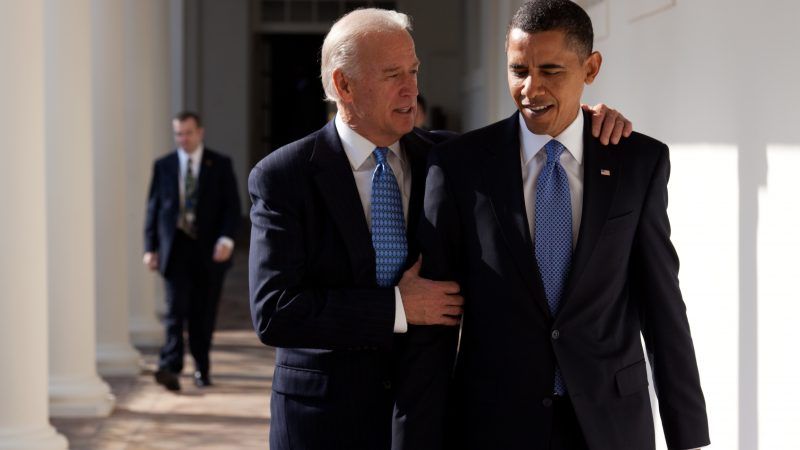2020 Dems Love Obama, Hate Obama's Policies
For both good and ill, the Democratic field has moved so far to the left that 2012 Obama would have a hard time fitting in.

How does a political party replicate the electoral success of its most revered member even while repudiating a whole host of his policies? That's the riddle facing Democrats in 2020.
An NBC/Wall Street Journal poll released last week put numbers on what has long been a visceral cultural nostalgia for the 44th presidency. Ninety percent of Democrats hold a favorable view of Barack Obama today, compared with just 4% unfavorable (Bill Clinton, by contrast, is at 64/15). Sixty-nine percent hold a "very positive" view of Obama, up 8 percentage points over 2015. Most relevant, 78% say they are "satisfied" that the previous occupant of the White House "did as much as was possible at the time in addressing issues facing the country."
So why, then, on issue after issue, are the 2020 Democratic presidential contenders staking out positions far to the left of anything Obama ever imagined — even while attempting to bask in his holy glow?
Remember when Rep. Joe Wilson (R-S.C.) shouted "You lie!" during Obama's 2009 speech to a joint session of Congress about the Affordable Care Act? That was in response to the president assuring lawmakers that Obamacare wouldn't cover immigrants in the U.S. illegally. In 2019, the only presidential candidates willing to say "no" when asked whether such patients should be covered under government health insurance are fourth-tier candidates John Delaney, Rep. Tim Ryan (D-Ohio), and Montana Gov. Steve Bullock.
Some of these changes are unambiguously for the better. At this point in the 2012 campaign, Obama was still cracking down on state-legal marijuana dispensaries and laughing derisively when asked about legalizing recreational pot. In 2019, the only presidential candidate not in favor of full legalization is Joe Biden.
And eight years ago was peak surge time for the war in Afghanistan. This month, not only did all the candidates speaking about it at the debate agree to bring the troops home, there was even talk of restoring the legislative branch's constitutional role in declaring war, a notion that Obama brazenly flouted in Libya.
But on economic and spending issues, the recent Democratic past — including Obama's campaign promise of a "net spending cut" — might as well be another planet. Such has been the outsize role of Sen. Bernie Sanders (I-Vt.) in moving domestic policy to the left that he occasionally finds himself outflanked in both promissory extravagance (Julián Castro's reparations for slavery come to mind), and also in the polls.
The largely unacknowledged dissonance between Obama's iconography and policy platform has led to some of the 2020 campaign's more embarrassing moments, such as when front-runner Biden claimed (falsely) about the previous administration's immigration record: "We didn't lock people up in cages. We didn't separate families."
The evident discomfort at being challenged in 2019 for holding 2012-era views is hardly limited to Obama's vice president, even if Biden's half-century of nonprogressive policymaking makes him the juiciest target for the Very Online Left. Basically every time Sen. Kamala Harris (D-Calif.) attempts to portray herself as a lifelong criminal justice reformer, ghosts from her attorney general past come bearing receipts.
On gay marriage and deportations, on boosting charter schools and enabling hydraulic fracturing, Democrats in 2019 are just in a different place.
Some of the shift is a reflection of changing public opinion. Approval of gay marriage, thank goodness, has gone in just 15 years from 2 to 1 against to 2 to 1 in favor. And in 2003, 71% of Americans said George W. Bush made the right decision in launching the Iraq war, compared with just 43% today.
But Democratic candidates, rather than keeping abreast of the electorate, are also charging ahead into uncharted waters. Whereas Obama tied himself in knots to get a 10-year price estimate on his signature piece of legislation at under $1 trillion, that's far less than the opening bids on any number of 2020 candidates' plans. Spending proposals have gotten so wild that few people raised an eyebrow when Harris suggested $2 trillion alone for historically black colleges.
It is no small irony that one of the only candidates recognizing potential constraints on presidential action is the one with the most damning votes on his record: Joe Biden. And so the 2020 primary race may boil down to one question: Is Biden capable of admitting his mistakes without spitting out a word salad of defensive gibberish, and if so, are Democratic voters willing to show grace to Obama's right-hand man?
This article originally appeared in the L.A. Times.


Show Comments (96)